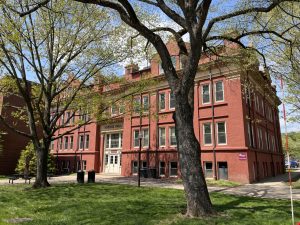Medicinal marijuana on our minds
Invite Mary Jane into our campus housing
November 14, 2019
Pennsylvania passed the Medical Marijuana Program law in 2016. This law allows the access to medical marijuana for patients with serious medical conditions through a safe and effective method of delivery which works to balance patient need for access to the latest treatments with care and safety. Pennsylvania now homes over a dozen dispensaries that sell medical marijuana.
Medical marijuana uses the marijuana plant to treat diseases and conditions by taking the produced THC (Delta-9-tetrahydrocannabinol) and CBD (cannabidiol) to provide relief in a therapeutic form. Medical Marijuana is proven to reduce chronic pain, nausea and vomiting. In addition, there is research that provides evidence that it can help reduce anxiety, inflammation, and even kill certain cancer cells.
At this point medical marijuana is legal in 39 of the 50 states and is continuing to be decriminalized and becoming more available. Bloomsburg University, like many Pennsylvania state schools, is a dry campus. One policy change that has been popping up across the state is exempting students who live on campus and are over 21 years of age from the alcohol prohibition policies.
While here at Bloom we do not have a policy exclusion on alcohol there has been talk about what would happen if we passed one. In addition to alcohol being questioned talk of a student having medical marijuana and wanting or needing to live on campus has also come up in recent discussions. These discussions lead to serious questions that need to be considered by our university officials.
What about students with very real diseases or conditions that medical marijuana can help? After speaking with a representative from Bloomsburg University’s Residence Life as well as reviewing the student code of conduct for the 2019/2020 school year there is currently a policy on marijuana, medical or recreational, that indicates possessing or using controlled substances will result in loss of housing, suspension, and possibly even expulsion.
Even if one has a medical marijuana card, which isn’t easy to get, they are not able to live on campus and utilize this form of treatment, even though the treatment is recommended by a medical professional. Bloomsburg also has a policy that requires freshman, under 20 years old, to live on campus for their first two semesters.
This is confusing to me. If a freshman does have a medical marijuana card for actual medicinal purposes, they are not able to utilize it until they move off campus, which they are not permitted to do until they are sophomores.
Personally, I think this is absurd. If a student has a real medical diagnosis that causes their doctor to recommend the use of medical marijuana as treatment, then there needs to be an excuse for the student. I understand that there are school policies, but there needs to be an acknowledgment that Pennsylvania laws should be considered as more significant than the school policies.
Pennsylvania law, Act 16, Section 2103, states that there can be no civil penalty or disciplinary action toward a person who utilizes Medical Marijuana. I think that closes the case regarding students ability to have medicinal marijuana on campus.
Sarah Emily is a senior English major and the A&E Editor for The Voice.

















